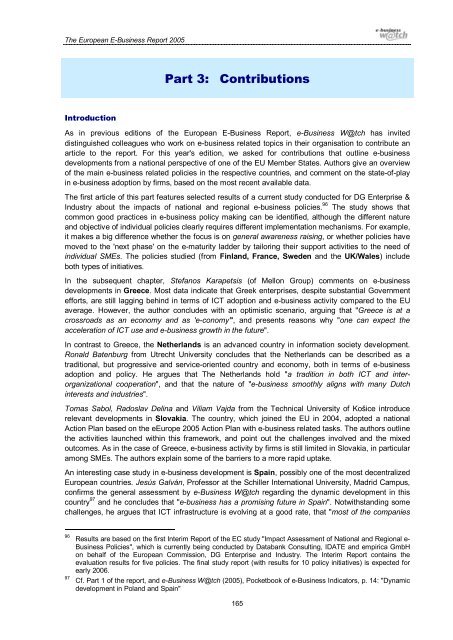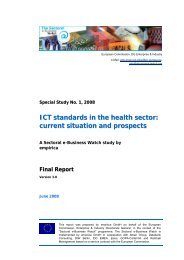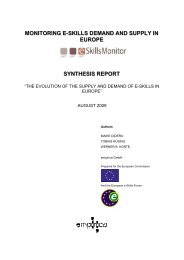The European e-Business Report The European e ... - empirica
The European e-Business Report The European e ... - empirica
The European e-Business Report The European e ... - empirica
Create successful ePaper yourself
Turn your PDF publications into a flip-book with our unique Google optimized e-Paper software.
<strong>The</strong> <strong>European</strong> E-<strong>Business</strong> <strong>Report</strong> 2005<br />
Part 3: Contributions<br />
Introduction<br />
As in previous editions of the <strong>European</strong> E-<strong>Business</strong> <strong>Report</strong>, e-<strong>Business</strong> W@tch has invited<br />
distinguished colleagues who work on e-business related topics in their organisation to contribute an<br />
article to the report. For this year's edition, we asked for contributions that outline e-business<br />
developments from a national perspective of one of the EU Member States. Authors give an overview<br />
of the main e-business related policies in the respective countries, and comment on the state-of-play<br />
in e-business adoption by firms, based on the most recent available data.<br />
<strong>The</strong> first article of this part features selected results of a current study conducted for DG Enterprise &<br />
Industry about the impacts of national and regional e-business policies. 96 <strong>The</strong> study shows that<br />
common good practices in e-business policy making can be identified, although the different nature<br />
and objective of individual policies clearly requires different implementation mechanisms. For example,<br />
it makes a big difference whether the focus is on general awareness raising, or whether policies have<br />
moved to the 'next phase' on the e-maturity ladder by tailoring their support activities to the need of<br />
individual SMEs. <strong>The</strong> policies studied (from Finland, France, Sweden and the UK/Wales) include<br />
both types of initiatives.<br />
In the subsequent chapter, Stefanos Karapetsis (of Mellon Group) comments on e-business<br />
developments in Greece. Most data indicate that Greek enterprises, despite substantial Government<br />
efforts, are still lagging behind in terms of ICT adoption and e-business activity compared to the EU<br />
average. However, the author concludes with an optimistic scenario, arguing that "Greece is at a<br />
crossroads as an economy and as 'e-conomy'", and presents reasons why "one can expect the<br />
acceleration of ICT use and e-business growth in the future".<br />
In contrast to Greece, the Netherlands is an advanced country in information society development.<br />
Ronald Batenburg from Utrecht University concludes that the Netherlands can be described as a<br />
traditional, but progressive and service-oriented country and economy, both in terms of e-business<br />
adoption and policy. He argues that <strong>The</strong> Netherlands hold "a tradition in both ICT and interorganizational<br />
cooperation", and that the nature of "e-business smoothly aligns with many Dutch<br />
interests and industries".<br />
Tomas Sabol, Radoslav Delina and Viliam Vajda from the Technical University of Košice introduce<br />
relevant developments in Slovakia. <strong>The</strong> country, which joined the EU in 2004, adopted a national<br />
Action Plan based on the eEurope 2005 Action Plan with e-business related tasks. <strong>The</strong> authors outline<br />
the activities launched within this framework, and point out the challenges involved and the mixed<br />
outcomes. As in the case of Greece, e-business activity by firms is still limited in Slovakia, in particular<br />
among SMEs. <strong>The</strong> authors explain some of the barriers to a more rapid uptake.<br />
An interesting case study in e-business development is Spain, possibly one of the most decentralized<br />
<strong>European</strong> countries. Jesús Galván, Professor at the Schiller International University, Madrid Campus,<br />
confirms the general assessment by e-<strong>Business</strong> W@tch regarding the dynamic development in this<br />
country 97 and he concludes that "e-business has a promising future in Spain". Notwithstanding some<br />
challenges, he argues that ICT infrastructure is evolving at a good rate, that "most of the companies<br />
96<br />
97<br />
Results are based on the first Interim <strong>Report</strong> of the EC study "Impact Assessment of National and Regional e-<br />
<strong>Business</strong> Policies", which is currently being conducted by Databank Consulting, IDATE and <strong>empirica</strong> GmbH<br />
on behalf of the <strong>European</strong> Commission, DG Enterprise and Industry. <strong>The</strong> Interim <strong>Report</strong> contains the<br />
evaluation results for five policies. <strong>The</strong> final study report (with results for 10 policy initiatives) is expected for<br />
early 2006.<br />
Cf. Part 1 of the report, and e-<strong>Business</strong> W@tch (2005), Pocketbook of e-<strong>Business</strong> Indicators, p. 14: "Dynamic<br />
development in Poland and Spain"<br />
165

















